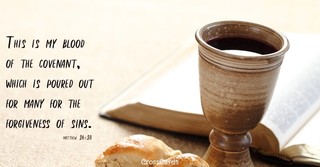
- Recent Translations
- All Translations
Matthew 26:21
Share
Settings
Images for Matthew 26:21

Matthew 26:21 Meaning and Commentary
And as they did eat
The passover lamb, the unleavened bread, and bitter herbs: he said it was usual, whilst they were thus engaged, to discourse much about the reason and design of this institution. What they talked of may be learnt from what follows F25:
``it is an affirmative precept of the law, to declare the signs and wonders which were done to our fathers in Egypt, on the night of the fifteenth of Nisan, according to ( Exodus 13:3 ) , "remember this day" and from whence on the night of the fifteenth? from ( Exodus 13:8 ) , "and thou shalt show thy son" at the time that the unleavened bread, and bitter herbs lie before thee. And though he has no son, or though they are wise, and grown up, they are bound to declare the going out of Egypt; and everyone that enlarges, or dwells long on the things that happened and came to pass, lo! he is praiseworthy. It is a command to make known to children, even though they do not ask; as it is said, "and thou shalt show thy son": according to the son's knowledge, his father teaches him; how if he is a little one, or foolish? he says to him, my son, all of us were servants, as this handmaid, or this servant, in Egypt; and on this night the holy, blessed God redeemed us, and brought us into liberty: and if the son is grown up and a wise man, he makes known to him what happened to us in Egypt, and the wonders which were done for us by the hands of Moses, our master; all according to the capacity of the son. And it is necessary to make a repetition on this night, that the children may see, and ask, and say, how different is this night from all other nights? until he replies to them, and says to them, so and so it happened, and thus and thus it was.--If he has no son, his wife asks him; and if he has no wife, they ask one another, how different is this night? and though they are all wise men, everyone asks himself alone, how different is this night? and it is necessary to begin with reproaches, and end with praise, how? he begins and declares, how at first our fathers were in the days of Terah, and before him, deniers (of the divine being), and wandering after vanity, and following idolatrous worship; and he ends with the law of truth, how that God brought us near to himself, and separated us from the nations, and caused us to draw nigh to his unity; and so begins and makes known, that we were servants to Pharaoh in Egypt, and all the evils he recompensed us with; and ends with the signs and wonders which were wrought for us, and with our liberties: and he that expounds from--"a Syrian was my father, ready to perish": till he has finished the whole section: and every one that adds and enlarges in expounding this section, lo! he is praiseworthy. And everyone that does not say these three words on the night of the fifteenth, cannot be excused from blame; and they are these, the passover, the unleavened bread, and the bitter herbs: "the passover", because God passed over the houses of our fathers in Egypt, as it is said, ( Exodus 12:27 ) , "the bitter herbs", because the Egyptians made bitter the lives of our fathers in Egypt: "the unleavened bread", because they were redeemed: and these things all of them are called the declaration, or showing forth.''Christ now took up some part of the time, at least, whilst they were eating, in discoursing with his disciples about the traitor:
he said, verily I say unto you, that one of you shall betray me;
meaning to the chief priests and Scribes, who should condemn him to death, and deliver him to the Gentiles, to be mocked, scourged, and crucified, as he had told them some time before, ( Matthew 20:18 Matthew 20:19 ) , though he did not tell them as now, that it should be done by one of them; he had indeed signified as much as this two days before, at the supper in Bethany, but none seemed to understand whom he meant, but Peter and John, and the thing wore off their minds; and therefore he mentions it again to them, with great seriousness, and in the most solemn manner, declaring it as a certain and undoubted truth.
F25 Maimon. ib. c. 7. sect. 1, 2, 3, 4, 5. Vid. c. 8. 2, 3, 4, 5. & Haggadah Shel. Pesach. p. 5, 6, 7, 8.